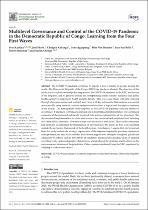Multilevel governance and control of the Covid-19 pandemic in the Democratic Republic of Congo: Learning from the four first waves
Abstract
The COVID-19 pandemic continues to impose a heavy burden on people around the
world. The Democratic Republic of the Congo (DRC) has also been affected. The objective of this
study was to explore national policy responses to the COVID-19 pandemic in the DRC and drivers
of the response, and to generate lessons for strengthening health systems’ resilience and public
health capacity to respond to health security threats. This was a case study with data collected
through a literature review and in-depth interviews with key informants. Data analysis was carried
out manually using thematic content analysis translated into a logical and descriptive summary
of the results. The management of the response to the COVID-19 pandemic reflected multilevel
governance. It implied a centralized command and a decentralized implementation. The centralized
command at the national level mostly involved state actors organized into ad hoc structures. The
decentralized implementation involved state actors at the provincial and peripheral level including
two other ad hoc structures. Non-state actors were involved at both levels.

